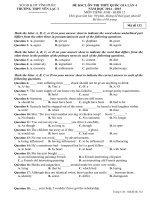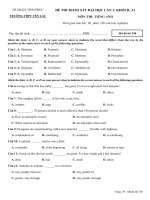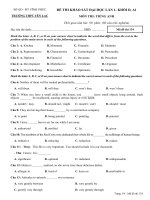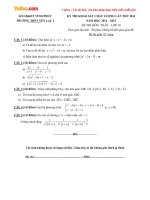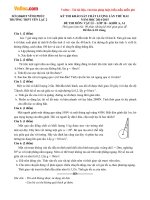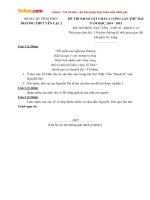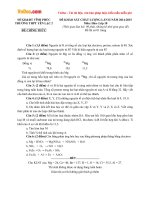Đề thi học kì 2 môn Tiếng Anh lớp 11 năm 2020-2021 có đáp án - Trường THPT Yên Lạc 2
Bạn đang xem bản rút gọn của tài liệu. Xem và tải ngay bản đầy đủ của tài liệu tại đây (281.57 KB, 6 trang )
SỞ GD&ĐT VĨNH PHÚC
TRƯỜNG THPT YÊN LẠC 2
KỲ KSCL KHỐI 11 LẦN 2 NĂM HỌC 2020-2021
Đề thi môn: TIẾNG ANH
Thời gian làm bài 60 phút, không kể thời gian phát đề.
Đề thi gồm 05 trang.
Mã đề: 601
Mark the letter A, B, C, or D on your answer sheet to indicate the underlined part that needs correction
in each of the following questions.
Question 1. Speech sounds are produced as a continuous sound signal rather than discreet units.
A. Speech
B. signal
C. discreet
D. are produced
Question 2. I feel both excited and nervously because I have an interview tomorrow.
A. nervously
B. excited
C. feel
D. have
Question 3. What happened in that city were a reaction from city workers including firemen and
policemen who had been laid off from their jobs.
A. their
B. What happened
C. were
D. including
Mark the letter A, B, C, or D on your answer sheet to indicate the sentence that best completes each
of the following exchanges.
"
Question 4. Mary. "Would you mind if I use your computer for an hour?" Tony." __
A. Of course not. I still need it now
B. Not at all. I've finished my job.
C. Yes, you can use it
D. Yes. It's all right.
Question 5. - Kathy. "Make yourself at home" - Jim. " _______"
A. That's very kind. Thank you.
B. Thanks! Same to you.
C. Yes. Can I help you?
D. Not at all. Don't mention it.
Mark the letter A, B, C, or D to indicate the word that differs from the other three in the position of
the primary stress in each of the following questions.
Question 6. A. effect
B. destroy
C. mistake
D. butcher
ordinary
endangerment
rhinoceros
Question 7. A.
B.
C.
D. priority
Mark the letter A, B, C, or D on your answer sheet to indicate the word whose underlined part differs
from the other three in pronunciation in each of the following questions.
Question 8. A. sponsored B. completed
C. answered
D. enjoyed
Question 9. A. twofold B. twin
C. twinkle
D. twelve
Mark the letter A, B, C or D to indicate the word(s) OPPOSITE in meaning to the underlined word(s)
in each of the following questions.
Question 10. A chronic lack of sleep may make us irritable and reduces our motivation to work.
A. responsive
B. calm
C. miserable
D. uncomfortable
Question 11. "What I've got to say to you now is strictly off the record and most certainly not for
publication" said the government official to the reporter.
A. beside the point
B. not recorded
C. already official
D. not popular
Mark the letter A, B, C, or D on your answer sheet to indicate the sentence that is closest in meaning
to each of the following questions.
Question 12. "If I were you, I would not choose to write about such a sensitive topic" the teacher said.
A. I was ordered by the teacher not to write about such a sensitive topic.
Page 1 of 5 – Mã đề 601
B. The teacher advised me on writing about such a sensitive topic.
C. The teacher advised me against writing about such a sensitive topic.
D. I was blamed for writing about such a sensitive topic by the teacher.
Question 13. No matter how hard Fried tried to start the car, he didn't succeed.
A. Fried tried hard to start the car, and with success.
B. It's hard for Fried to start the car because he never succeeded.
C. Fried tried very hard to start the car, and succeeded.
D. However hard he tried, Fried couldn't start the car.
Question 14. Martin missed his flight because he had not been informed of the change in flight schedule.
A. Not having missed his flight, Martin was informed of the change in flight schedule.
B. Not having been informed of the change in flight schedule, Martin missed his flight.
C. Martin had been informed of his flight delay, which was due to the change in flight schedule.
D. Martin missed his flight, though he had been informed of the change in flight schedule.
Mark the letter A, B, C or D to indicate the word(s) CLOSEST in meaning to the underlined word(s)
in each of the following questions.
Question 15. Global warming occurs when the greenhouse gases in the atmosphere trap the heat from
the sun.
A. dispose
B. catch
C. release
D. discharge
Question 16. "It's no use talking to me about metaphysics. It's a closed book to me."
A. a book that is never opened
B. a subject that I don't understand
C. a theme that I don't like to discuss
D. an object that I don't really love
Mark the letter A, B, C, or D on your answer sheet to indicate the sentence that best combines each
pair of sentences in the following questions.
Question 17. I do my homework and schoolwork in separate books. I don't get muddled up.
A. I do not get muddled up due to the separation between homework and schoolwork.
B. I would get muddled up if I did not separate homework from schoolwork.
C. I do my homework and schoolwork in separate books so that I don't get muddled up.
D. Having two separate books at home and at work helps me avoid getting muddled up.
Question 18. Most scientists know him well. However, very few ordinary people have heard of him.
A. Many ordinary people know him better than most scientists do.
B. He is the only scientist that is not known to the public.
C. Not only scientists but also the public know him as a big name.
D. Well known to scientists as he is, he is little known to the public.
Mark the letter A, B, C, or D on your answer sheet to indicate the correct answer to each of the
following questions.
Question 19. We should read different kinds of books ________ our general knowledge.
A. widened
B. widen
C. to widen
D. widening
Question 20. Your store needs a bold sign that will catch the _______ of anyone walking down the
street. That may help to sell more products.
A. eye
B. flash
C. glimpse
D. sight
Question 21. ________his homework, he started to surf the social networks.
A. After he has finished
B. By the time he finishes
C. At the time he finished
D. After he had finished
Human
activities
are
also
blamed
_______
having contributed to global warming.
Question 22.
A. for
B. with
C. on
D. at
Page 2 of 5 – Mã đề 601
Question 23. Before the man could say anything more, Peter________ off towards the station.
A. was rushing
B. had rushed
C. had been rushed D. Rushed
Question 24. _____ people who live in Scotland are called _____ Scots.
A. The/a
B. The/the
C. x / x
D. The / x
The
pointless
war
between
the
two
countries
left
thousands
of people dead and seriously
Question 25.
_______
A. injured
B. wounded
C. damaged
D. spoilt
Question 26. High intelligent machines can be automated to operate without human_______
A. intervene
B. intervention
C. intervening
D. interventionist
Question 27. Mike has no difficulty in ____ into use the perfect plans his friends have prepared for him.
A. taking
B. heading
C. putting
D. ending
Question 28. ______ interested in Curling, I would try to learn more about this sport.
A. If I was
B. If I am
C. Should I
D. If I were
Question 29. We were expecting beautiful weather at the beach, but it was so cold and rainy that,
________ getting a suntan, I caught a cold.
A. instead of
B. just as
C. compared to
D. in case of
Question 30. The book ________last week is her first novel about a World Heritage Site in Viet Nam.
A. to be published
B. publishing
C. published
D. to publish
Question 31. At school, people always used to take the ________ out of him for having red hair.
A. rat
B. mickey
C. dog
D. cat
Question 32. It seems that he won't go to the party tonight, ________?
A. does it
B. won't he
C. will he
D. doesn't it
Question 33. The United States, China and India are now competing for political influence in ASEAN,
and France, a leading European country, does not want to be________.
A. gone after
B. followed in
C. left out
D. put off
Read the following passage and mark the letter A, B, C, or D on your answer sheet to indicate the
correct word or phrase that best fits each of the numbered blanks.
PARENTAL INFLUENCES ON CHILDREN
Our parents play an important role in what we're today and in what we'll be in future. It's our
parents who make us (34)_____ in all sphere of life, they guide us, support us, teach us, and propel
us in all phases of your life. The biggest role is of our mother, most cherished and admired relation in
the world. She is special for everyone and should be. She is one (35)_____ teaches us everything from
how to speak to what to speak, from how to eat to what to eat, from how to (36)____ up for school to
college. She is with us from happiness to sorrow. She teaches us from what is right to what is wrong.
Definitely she is one who brings smiles on our faces when we take a walk down memory
(37)______ from our childhood till now. But when I recall my childhood, what I have is her faint
memory; unfortunately, probably when I was about 5 years old she left this world. When I look
around, I realize how lucky they are who have someone under whose feet lies the paradise. So realize
importance of her presence in your life and love her (38)______ the way she loves you
unconditionally; dedicate every day of your life to her and don't wait for mother day; celebrate
everyday a mother day.
(Source: < />Question 34. A. success B. succeed
C. successfully
D. successful
Question 35. A. whom
B. who
C. which
D. whose
Question 36. A. take
B. get
C. cheer
D. dress
pavement
road
way
Question 37. A.
B.
C.
D. lane
Question 38. A. like
B. similar
C. alike
D. as
Page 3 of 5 – Mã đề 601
Read the following passage and mark the letter A, B, C, or D on your answer sheet to indicate the
correct answer to each of the questions below.
WHAT IS YOUR LEARNING STYLE?
Everyone is different - but for many years, students have been asking questions about their learning
styles. If you find yourself learn better by making notes during the lecture, or when the teacher uses a
new word, you want to see it written immediately, then you are very likely to be a more visual learner.
You prefer to see the written words. You learn by reading and writing. Visual learners often think in
pictures. If you find a particular task or text difficult, look for sources that will suit your learning style,
for example sources with illustrations, charts, tables, or videos.
If you prefer recording the lecture and listening again to taking notes, or you memorize something by
repeating it aloud instead of writing it out several times, you are probably a more auditory learner. You
prefer to learn by listening and speaking. Auditory learners often learn best from lectures, discussions,
by reading aloud, and by listening to audio material.
However, it is probably that you, like most people, learn through a mixture of styles. Sometimes you
may prefer to learn by reading, at other time by listening. Ask yourself which is the best style for the
particular task you are doing.
Question 39. Which of the following best serves as the title for the passage?
A. Different learning styles
B. Auditory learners prefer to learn by listening and speaking
C. Visual learners often think in pictures.
D. The best style for the particular task
Question 40. What does the word "it" in paragraph 1 refer to?
A. the written word
B. the note
C. the new word
D. the lecture
The
word
"auditory"
in
paragraph
2
can
be
best
replaced
by
____.
Question 41.
A. recordable
B. discussive
C. noisy
D. audible
Question 42. Which of the following statement is TRUE?
A. Most people are auditory learners.
B. Auditory learners prefer listening to speaking.
C. When learning something by heart, an auditory learner prefers reading it out loud.
D. Auditory learners hate taking notes.
Question 43. The word "visual" in paragraph 1 is closest in meaning to ____.
A. seeable
B. picturesque
C. written
D. illustrative
Read the following passage and mark the letter A, B, C, or D on your answer sheet to indicate the
correct answer to each of the questions below.
GLOBAL WARMING
The temperature of the Earth is rising at nearly twice the rate it was 50 years ago. This rapid rate and
pattern of warming, scientists have concluded, cannot be explained by natural cycles alone. The only
way to explain the pattern is to include the effect of greenhouse gases (GHGs) emitted by humans.
To come to a conclusion on climate change, the United Nations formed a group of scientists called
the Intergovernmental Panel on Climate Change, or IPCC. The IPCC meets every few years to review
the latest scientific findings and write a report summarizing all that is known about global warming. Each
report represents a consensus, or agreement, among hundreds of leading scientists.
One of the first things the IPCC learned is that there are several greenhouse gases responsible for
warming, and humans emit them in a variety of ways. Most come from the combustion of fossil fuels in
cars, factories and electricity production. The gas responsible for the most warming is carbon dioxide,
also called CO2. Other contributors include methane released from landfills and agriculture, especially
from the digestive systems of grazing animals, nitrous oxide from fertilizers, gases used for refrigeration
Page 4 of 5 – Mã đề 601
and industrial processes, and the loss of forests that would otherwise store CO2.
Different greenhouse gases have very different heat-trapping abilities. Some of them can even trap
more heat than CO2. A molecule of methane produces more than 20 times the warming of a molecule of
CO2. Nitrous oxide is 300 times more powerful than CO2.
Other gases, such as chlorofluorocarbons, or CFCs, which have been banned in much of the world
because they also degrade the ozone layer, have heat-trapping potential thousands of times greater than
CO2. But because their concentrations are much lower than CO2, none of these gases adds as much
warmth to the atmosphere as CO2 does.
In order to understand the effects of all the gases together, scientists tend to talk about all
greenhouse gases in terms of the equivalent amount of CO2. Since 1990, yearly emissions have gone up
by about 6 billion metric tons of "carbon dioxide equivalent" worldwide, more than a 20 percent increase
Source: <https://www>. nationalgeographic. com
Question 44. Which of the following best serves as the title for the passage?
A. Causes of global warming
B. Greenhouse gases and global warming
C. Fossil fuels and global warming
D. Effects of global warming
Question 45. The word "consensus" in paragraph 2 probably means ______
A. A conversation or discussion in which two or more people disagree
B. A situation where people have different opinions
C. An opinion that all members of a group agree with
D. A lack of agreement between facts, opinions, actions.
Question 46. Which of the following is NOT mentioned in paragraph 3 as a reason for warming?
A. Carbon dioxide
B. Methane
C. Nitrous oxide
D. Carbon monoxide
Question 47. The word "contributors" in paragraph 3 mostly means_______.
A. Fossil fuels
B. Humans
C. Cars and factories
D. Gases responsible for global warming
Question 48. It can be inferred from paragraph 5 that CO2 ________.
A. Adds the most warmth to the atmosphere B. Degrades the ozone layer
C. Traps less heat than other gases
D. Has lower concentration than other gases
Question 49. According to paragraph 2, what is the main work of IPCC every few years?
A. Forming a group of scientists
B. Reviewing the latest scientific findings
C. Meeting every few years
D. Concluding on climate change
Question 50. The word "which" in paragraph 5 refers to which of the following?
A. Chlorofluorocarbons
B. Ozone layer
C. Other gases
D. CO2
---------- THE END ----------
Page 5 of 5 – Mã đề 601
MÃ ĐỀ
1
2
3
4
5
6
7
8
9
10
11
12
13
14
15
16
17
18
19
20
21
22
23
24
25
26
27
28
29
30
31
32
33
34
35
36
37
38
39
40
41
42
43
44
45
46
47
48
49
50
601
C
A
C
B
A
D
A
B
A
B
C
C
D
B
B
C
C
D
C
A
D
A
B
B
B
B
C
D
A
C
B
C
C
D
B
D
D
D
A
C
D
C
A
A
C
D
D
A
B
A
602
A
C
A
A
D
A
A
B
B
A
A
D
B
C
C
B
C
A
B
D
D
D
A
D
D
A
C
C
C
B
B
D
C
B
A
D
B
C
B
A
D
C
C
C
D
B
D
B
C
B
603
B
A
D
A
A
D
D
D
D
B
C
C
C
A
A
B
C
C
B
C
D
B
A
D
B
D
A
A
C
C
C
B
C
D
B
A
D
A
B
A
C
D
B
B
D
A
B
C
C
B
604
B
A
C
B
C
A
A
D
B
A
B
D
B
C
B
C
A
B
C
C
C
A
A
C
D
C
B
D
B
D
B
B
D
B
C
D
C
A
A
D
D
A
D
B
A
C
C
D
D
A
605
D
B
D
B
D
C
C
B
C
B
A
A
D
A
D
C
A
A
B
A
C
C
A
D
C
B
C
B
C
C
C
A
B
D
A
A
D
B
B
A
D
D
C
B
D
B
A
D
B
C
606
B
B
D
C
D
A
C
B
D
C
A
A
D
C
D
A
D
C
C
B
A
B
D
A
B
D
A
A
C
A
D
D
C
B
B
C
B
A
D
B
A
C
B
A
C
C
B
D
C
B
